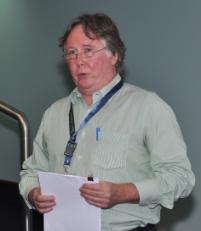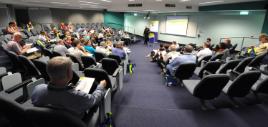Performance evidence 'crucial' for unis dealing with tertiary education agency
Published on 11 October, 2012
University performance evaluation systems are a key source of evidence that will be crucial for institutions dealing with the Tertiary Education Quality and Standards Agency (TEQSA)...
That's according to TEQSA representative Ian Kimber who was the day-one keynote speaker for the Australasian Higher Education Evaluation Forum (AHEEF) 2012, being hosted by CQUniversity Rockhampton Campus this week.
LINK also to Higher education reforms bearing fruit, says visitor AND Uni evaluators enjoy forum dinner at coast
"Our regulatory framework is evidence-based and evaluation systems are a key source of evidence," Mr Kimber said.
Mr Kimber said that evaluation specialists had a critical role in showing how well universities were doing their job in meeting standards and providing positive student outcomes.
"Evaluation also has a role in understanding the student experience ... there's always room for improvement," he said.
Meantime, day-two keynote Phil Aungles, from the federal Tertiary Education department, said he would be focusing on how the university sector has performed since the Federal Government reforms implemented in the wake of the Bradley Review.

Day-one keynote Ian Kimber addresses the forum
"In terms of funding, participation and quality, on most accounts the sector has been trending upwards," Mr Aungles said.
Around 50 forum delegates from throughout Australia and New Zealand are being welcomed to key sessions by CQUniversity senior executives Professor Scott Bowman, Professor Rob Reed and Professor Hilary Winchester. These delegates either evaluate the performance of universities or research best practice in performance evaluation.
With a focus on ‘Embedding an internal evaluation culture', this event has attracted presentations reflecting on 'student surveys', 'evaluation response incentives', 'response rates', 'quality perceptions', 'class size', 'engaging transnational students', and 'the war on attrition'.
The forum program represents the breadth and depth of evaluation practices and gives participants the chance to engage in scholarly discourse, discussion and exchange of practical understandings.
Details are via www.cqu.edu.au/aheef2012


